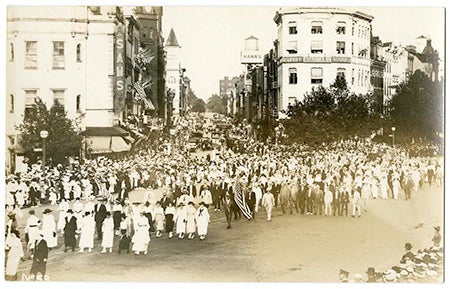March 4, 2020
An archivist’s job is never finished. Just when I thought I’d done a pretty good job rooting out all of the material regarding women’s rights advocacy in the manuscripts collections here, I was delighted to make some new discoveries. In time to celebrate Women’s History Month and the centenary of the 19th Amendment of the U.S. Constitution, giving women the right to vote, I’m sharing my latest finds with you in this month’s blog. Of course, this is an open invitation to come see these wonderful items in person at the Booth Family Center for Special Collections.
Woman's Suffrage Procession, 1913
(Janet Richards papers GTM540129, Box 2, Folder 6.1)
Click image to enlarge
Substantial correspondence from the leading suffragists who founded the National Woman’s Party are included in the James Brown Scott papers, GTM660503 (Box 48). James Brown Scott (1866-1943) was an American authority on international law and an advocate of women’s rights.
Edith Houghton Hooker (1879-1948), American suffragist and social worker. She was a leader of the suffrage movement in Maryland in the early 20th century and was posthumously inducted into the Maryland Women's Hall of Fame. She also happens to be maternal aunt of actress Katharine Hepburn.
Alice Stokes Paul (1885-1977), American feminist, socialist, and suffragist. She was among the principal leaders and strategists of the campaign for the 19th Amendment. As a leader of the National Woman’s Party, and together with fellow suffragist Lucy Burns (1879-1966), Paul organized activist events such as the Woman Suffrage Procession in 1913, the first organized march for women’s rights in Washington, D.C.; and the Silent Sentinels protest at the White House in 1917.
Doris Stevens (1892-1963), American suffragist, women's legal rights advocate and author. She was the first female member of the American Institute of International Law and first chair of the Inter-American Commission of Women.
Women’s rights leaders also appear in the Janet Richards papers, GTM540129. Janet Richards (1859-1948), was a Washington, D.C. journalist, advocate of women's rights and education, and intrepid traveler. She was a friend of suffragists Susan B. Anthony (1820-1906) and Clara Barton (1821-1912). Her personal papers include letters from both suffragists; as well as photographs of the 1913 Woman Suffrage Procession in Washington, D.C.
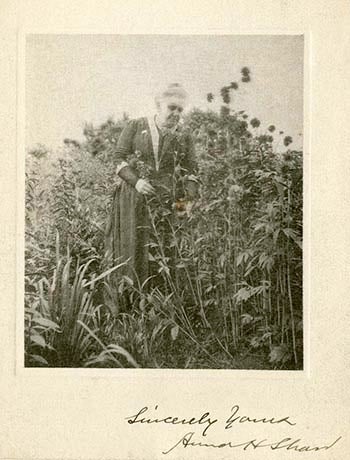
Anna Shaw. Signed photograph. No date.
(Janet Richards papers, GTM540129, Box 9, Folder 8)
Anna Shaw (1847-1919) was born in Newcastle-on-Tyne, England, immigrating with her family to the United States in 1851. Shaw devoted her life to the cause of women's rights despite earning a medical degree from Boston University, in 1855. She became a great orator on women’s suffrage and the longest-serving president (1904-1915) of the National American Woman Suffrage Association (NAWSA).
Other collections containing women’s right’s advocates include:
The papers of Esther Neira de Calvo (1890-1978). She was a prominent Panamanian educator, politician, and diplomat. The extensive collection of personal papers, including correspondence, photographs, manuscripts, speeches, and awards, provides a fascinating perspective on 20th century Panama and Inter-American cooperation, especially relating to women’s rights. Notable women in Neira de Calvo’s circle of acquaintances include Carrie Chapman Catt, Maria Ossa de Amador Guerrero, Matilde Obarrio de Mallet, Gabriela Mistral, Eva Peron, and Eleanor Roosevelt (see Esther Neira de Calvo papers GTM071217 and blog post by my colleague Scott Taylor, “Esther Neira de Calvo: Women’s Rights Advocate”).
Two letters from British suffragette Beatrice Harradan (1864-1936), are included in the Sir Newman Flower papers (GTMGamms300, Box 1, Folder 3).
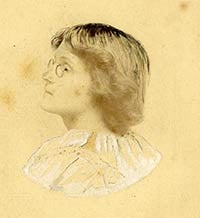
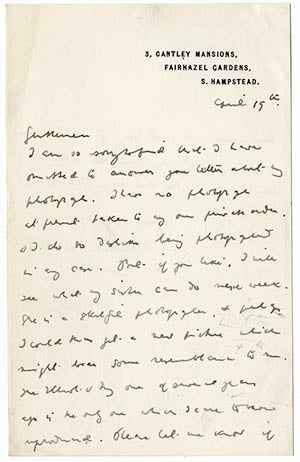
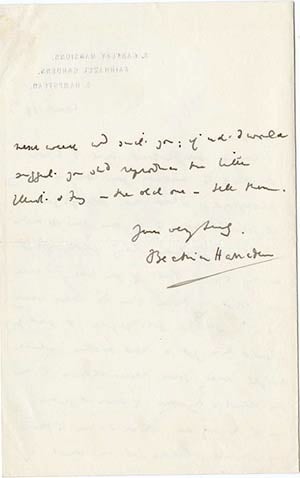
Beatrice Harradan. Letter and signed photograph. Incomplete date.
(Sir Newman Flower papers, GTMGamms300, Box 1, Folder 3)
Records of the National Council of Catholic Women may be of interest. The organization was founded in March 1920, under the auspices of the U.S. Catholic bishops in recognition of the accomplishments of Catholic women’s organizations during World War I. NCCW provided U.S. Catholic women a unified voice, a national service program, and the ability to reach out to each other through a national organization. Emphasis was given to the education of Catholic women so they could exercise their newfound civic duties granted by their right to suffrage in 1920 under the 19th Amendment to the U.S. Constitution. (National Council of Catholic Women records, GTM840321). For more information about the history and activities of the NCCW, go to the website https://www.nccw.org/.
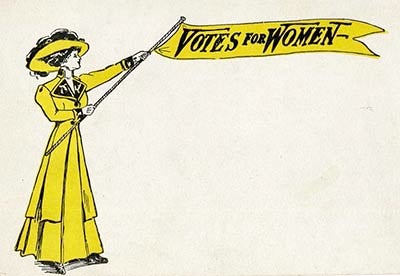
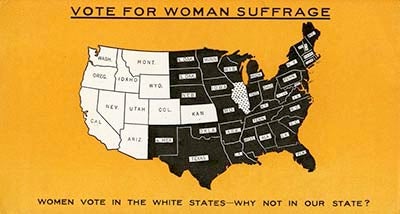
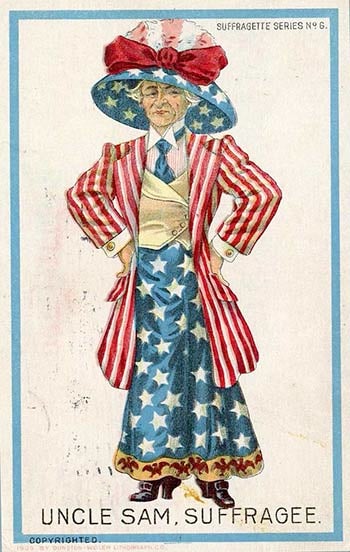
Women’s suffrage printed ephemera, circa 1910
(Janet Richards papers GTM540129, Box 2, Folder 6.2)
And finally, check out these related resources:
Rightfully Hers National Archives celebrates the centenary of the 19th Amendment with an exhibition of records, artifacts and photographs.
Inherownright.org In Her Own Right: Women Asserting Their Civil Rights, 1820-1920 showcases Philadelphia-area collections highlighting women’s struggles leading to the passage of the 19th Amendment. In Her Own Right is a pilot project executed by members of the Philadelphia Area Consortium of Special Collections Libraries (PACSCL), with funding from the National Endowment of the Humanities.
--Lisette Matano, Manuscripts Archivist

